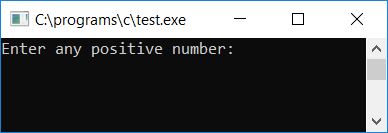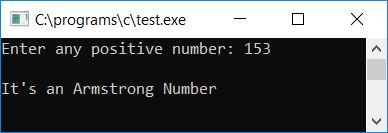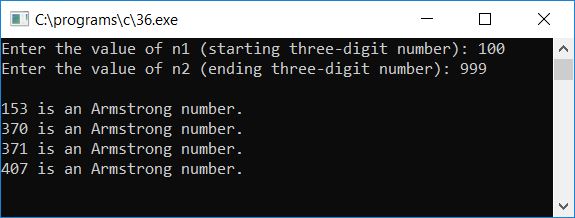- C Programming Examples
- C Programming Examples
- C Print Hello World
- C Get Input from User
- C Print Integer
- C Add Two Numbers
- C Add Subtract Multiply Divide
- C Add n Numbers
- C Area Perimeter of Square
- C Area Perimeter of Rectangle
- C Area Circum of Circle
- C Fahrenheit to Celsius
- C Celsius to Fahrenheit
- C Inches to Centimeters
- C Kilogram to Gram
- C Reverse a Number
- C Swap Two Numbers
- C Interchange Numbers
- C Print ASCII Value
- C Print Fibonacci Series
- C Check Palindrome or Not
- C Check Armstrong or Not
- C Find Armstrong Numbers
- C Find nCr and nPr
- C Find Profit Loss
- C Sum of their Square
- C First & Last Digit Sum
- C Sum of All Digit
- C Product of All Digit
- C Print Total Digit in Number
- C Check Perfect Number
- C Find Basic Gross Salary
- C Round Number to Integer
- C Print Series upto n Term
- C Find Factors of Number
- C if-else & Loop Programs
- C Check Even or Odd
- C Check Prime or Not
- C Check Alphabet or Not
- C Check Vowel or Not
- C Check Leap Year or Not
- C Is Reverse Equal Original
- C Make Calculator
- C Add Digits of Number
- Count Positive Negative Zero
- C Largest of Two Numbers
- C Largest of Three Numbers
- C Smallest of Two Numbers
- C Smallest of Three Numbers
- C Find Factorial of Number
- C Find LCM & HCF
- C Find LCM of n Numbers
- C Find HCF of n Numbers
- C Find Arithmetic Mean
- C Find Average, Percentage
- C Find Student Grade
- C Print Table of Number
- C Print Prime Numbers
- C Find Discount Purchase
- C Calculate Parcel Charge
- C Calculate Wage of Labor
- C Print Phone Bill
- C Conversion programs
- C Decimal to Binary
- C Decimal to Octal
- C Decimal to Hexadecimal
- C Binary to Decimal
- C Binary to Octal
- C Binary to Hexadecimal
- C Octal to Decimal
- C Octal to Binary
- C Octal to Hexadecimal
- C Hexadecimal to Decimal
- C Hexadecimal to Binary
- C Hexadecimal to Octal
- C Pattern Programs
- C Pattern Printing Programs
- C Print Diamond Pattern
- C Print Floyd's Triangle
- C Print Pascal's Triangle
- C Array Programs
- C 1D Array Programs
- C Linear Search
- C Binary Search
- C Largest Element in Array
- C Smallest Element in Array
- C Second Largest/Smallest
- C Count Even Odd
- C Array Element at Even
- C Array Element at Odd
- C Print Even Array Elements
- C Print Odd Array Elements
- C Sum/Product of Even/Odd
- C Reverse an Array
- C Insert Element in Array
- C Delete Element from Array
- C Merge Two Arrays
- C Bubble Sort
- C Selection Sort
- C Insertion Sort
- C Print Common Elements
- C 2D Array Programs
- C Add Two Matrices
- C Subtract Two Matrices
- C Transpose a Matrix
- C Multiply Two Matrices
- C Sum All Matrix Elements
- C Largest Element in Matrix
- C Print Row Column Total
- C 3D Array Programs
- C String Programs
- C Print String
- C Find Length of String
- C Compare Two String
- C Copy a String
- C Concatenate String
- C Reverse a String
- C Count Vowels Consonants
- C Replace Vowel in String
- C Delete Vowels from String
- C Delete Word from String
- C Frequency of Character
- C Count Word in String
- C Remove Spaces from String
- C Sort a String
- C Sort String in Alphabetical
- C Sort Words in Ascending
- C Sort Words in Descending
- C Uppercase to Lowercase
- C Lowercase to Uppercase
- C Swap Two Strings
- C Check Anagram or Not
- C Check Palindrome String
- C Print Number in Words
- C Print Successive Character
- C Character without Space
- C File Programs
- C Read a File
- C Write Content to File
- C Read & Display File
- C Copy a File
- C Merge Two Files
- C Reverse File
- C Count All Character in File
- C List Files in Directory
- C Encrypt & Decrypt a File
- C Delete a File
- C Misc Programs
- Generate Random Numbers
- C Print Date Time
- C Print Message with Time
- C Get IP Address
- C Print Smiling face
- C Pass Array to Function
- Add Two Numbers using Pointer
- C Address of Variable
- C Shutdown Computer
- C Programming Tutorial
- C Tutorial
C Program to Check the Armstrong Number
In this article, you will learn and get code for checking whether the given number by the user (at run-time) is an Armstrong number or not. But before going through the program, Let's first understand what an Armstrong number is.
How to Find an Armstrong Number
For a number to be an Armstrong number, the sum of the cubes of all of its digits must be equal to the number itself. For example, 153 is an Armstrong number. Because
- 153 = (1*1*1) + (5*5*5) + (3*3*3)
As you can clearly see, the sum of the cubes of all of its digits (1, 5, and 3) is equal to the number itself. So it is an Armstrong number. But the number 26 is not an Armstrong number. Because
- 26 != (2*2*2) + (6*6*6)
Now let's move on and implement it in a C program.
Check if the given number is an Armstrong number in C
The question is, "Write a program in C to check whether the given number is an Armstrong number or not." The answer to this question is:
#include<stdio.h> #include<conio.h> int main() { int n, nu, num=0, rem; printf("Enter any positive number: "); scanf("%d", &n); nu=n; while(nu!=0) { rem = nu%10; num = num + (rem*rem*rem); nu = nu/10; } if(num==n) printf("\nIt's an Armstrong Number"); else printf("\nIt's not an Armstrong Number"); getch(); return 0; }
The above program was written in the Code::Blocks IDE; therefore, after a successful build and run, here is the output you will get on your output screen:

Now supply any positive number, say 153, and press the ENTER key to see the output that will say whether it is an Armstrong number or not, as shown in the following snapshot:

Program Explained
- Get any positive number as input from the user, say 153.
- Now initialize the number to another variable, say nu, for the operation.
- Include a while loop to work with each and every digit of the given number, say 153.
- We have to find the remainder of the number one by one. The first remainder we will get is 3.
- Initialize 3 to the rem variable, calculate the cube of the rem, and initialize it to the num variable after summing it with the variable itself.
- At the start of the program, we set the num variable to 0.
- Divide the number nu by ten.
- Also, ensure that the value inside nu is not equal to 0.
- If the condition is met, the while loop is re-entered and do the same operation until nu holds the value 0.
- Therefore, at the first run of the while loop, rem holds 3, num holds 0 + 3*3*3 or 27, and nu holds 15. And at the second run of the while loop, rem holds 5, num holds 27 + 5*5*5 or 152, and nu holds 1. In the third run, rem is 1, num is 152 + 1*11*1 or 153, and nu is 0.
- At last, check whether the value of num is equal to the given number (the value present inside the variable n) or not.
- If it is equal, then the number is an Armstrong number; otherwise, the number is not an Armstrong number.
Here is another program in C that prints all Armstrong numbers between any two given three-digit numbers. To generate or print Armstrong numbers without caring about digits, refer to Generate Armstrong Numbers.
#include<stdio.h> #include<conio.h> int main() { int n1, n2, i, temp, rem, sum, prod; printf("Enter the value of n1 (starting three-digit number): "); scanf("%d", &n1); printf("Enter the value of n2 (ending three-digit number): "); scanf("%d", &n2); printf("\n"); for(i=n1; i<=n2; i++) { sum = 0; temp = i; while(temp>0) { rem = temp%10; sum = sum + (rem*rem*rem); temp = temp/10; } if(sum == i) printf("%d is an Armstrong number.\n", i); } getch(); return 0; }
Here is the sample run:

Now provide any three-digit number as the starting point, say 100, and another three-digit number as the ending point, say 999, to print all the Armstrong numbers present in between these two numbers. Here is the second snapshot of the sample run:

The logic in this program is nearly identical to that in the previous one, except that we have used a for loop to begin with n1 (the starting number) and end with n2 (the ending number).In between these two numbers, we have used the same concept inside the for loop, namely, if the number is found to be an Armstrong number, then print it out, otherwise get to the next one to check for Armstrong.
Before checking, initialize 0 to sum and i to the temp variable for the operation. Here we have used the sum variable in place of the num variable. You can choose something different; it is up to you.
The same program in different languages
« Previous Program Next Program »